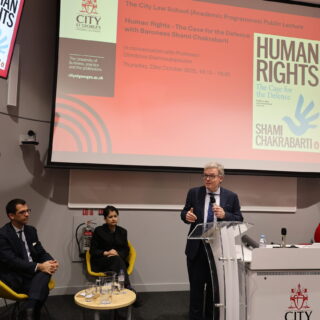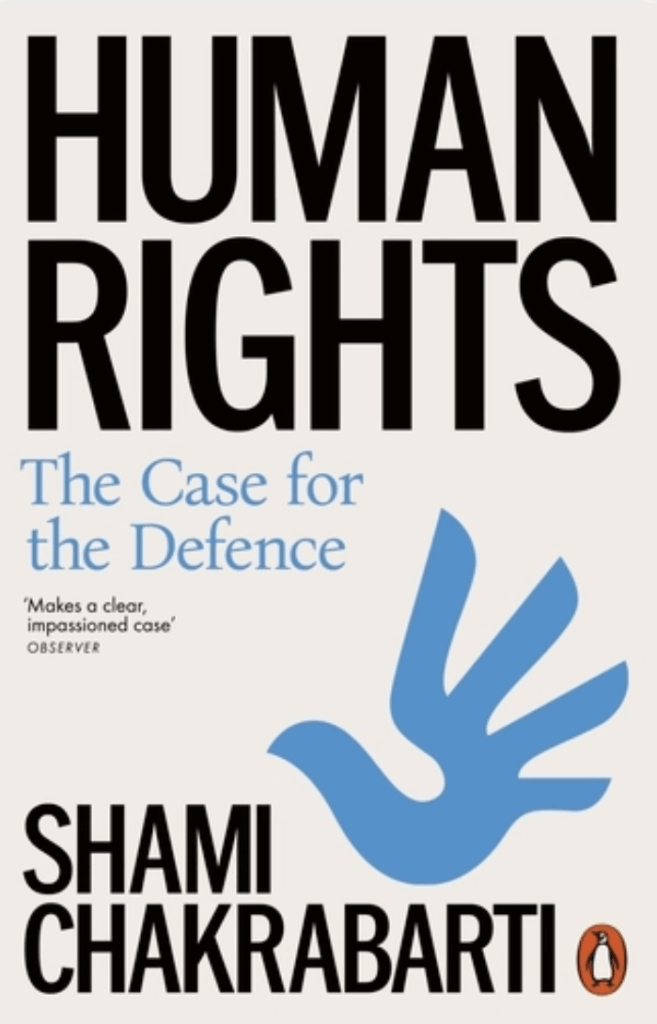“It’s not even a drumbeat. It’s a positive roar that human rights are outmoded and undemocratic”
It is rare and refreshing to hear such brutal honesty – or concern – as Baroness Shami Chakrabarti put on display over the course of these two hours. On the evening of the 23rd October, Chakrabarti gave an address, was interviewed by the City Law School’s Professor Dimitrios Giannoulopoulos, and then entertained via a thorough Q&A. It was an evening marked by clarity, directness, and consistency of argument.
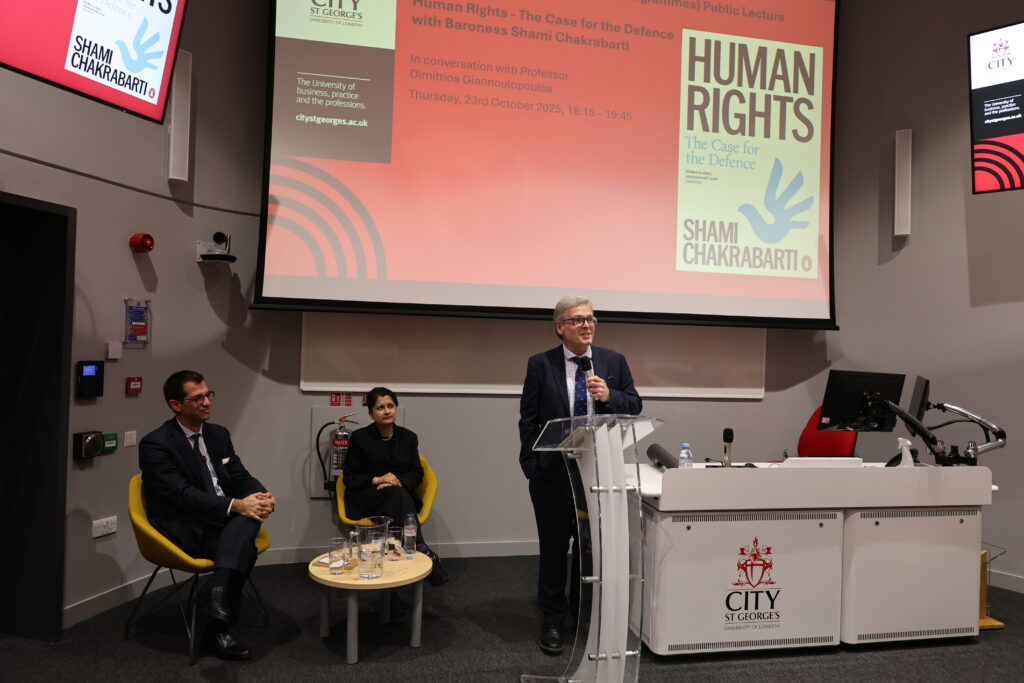
Her address was structured through the paradigm of her latest book, Human Rights: The Case for the Defence, a book which sits beside me today. To list just a handful of Baroness Chakrabarti’s achievements, she was the director of civil liberties campaigning group Liberty from 2003-2016, a panel member of the Leveson Inquiry, and Shadow Attorney General from 2016-2020; in 2016, she was elevated to a Life Peerage in the House of Lords for her services to Human Rights.
For all her many areas of expertise, Baroness Chakrabarti had one key message, which came to define the evening: we owe it to ourselves to know our own Human Rights.
“Without this education, we leave ourselves undefended.”
In the spirit of her message, this article touches on key themes from Baroness Chakrabarti’s address, and suggests how to explore these areas further.
When Rights Clash
Before digging into the case for the defence, Baroness Chakrabarti chose to establish the other party: if Human Rights are on trial, who is the complainant? Where do we see attacks on Human Rights originating from today, and why?
It would be impossible to host an event on Human Rights in the United Kingdom in 2025 without discussing the prospect of leaving the European Convention on Human Rights (ECHR). Chakrabarti sees this political trend as a painful echo of the discussions leading to ‘Brexit’. Chakrabarti’s criticism stems from her concern that those denouncing the ECHR are intentionally exploiting ignorance, to allow their rhetoric to stand unquestioned.
“Leaving the ECHR is being sold as Brexit 2, for really hard [Brits].”
Notably she was cautious not to lay blame solely on the so-called “right wing.” She criticised those on the left who denounce Human Rights measures as too individualistic. On the perceived dichotomy between ‘collective’ and ‘individual’ rights, Chakrabarti suggested that, in a social society, it is the distinction between the individual and the collective which is now “outmoded.”
Here, education is the remedy. Chakrabarti recalls working with Liberty to present students with a list of Fundamental Human Rights for discussion; she estimated 80-90% of students insisted that every single one was necessary.
“If you can remember the players on your football team… or the ingredients to your grandma’s recipe, you owe it to yourself to know your own rights and freedoms.”
AI & the Internet, or ‘the Modern Prometheus’
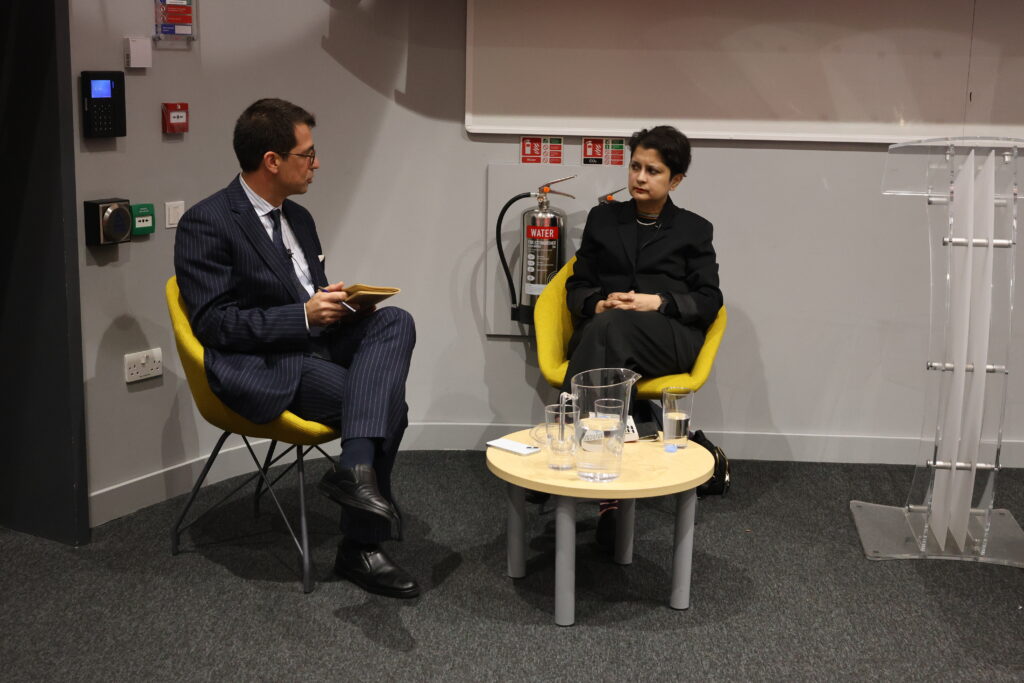
In this the title to Chapter 5, Chakrabarti adopts Mary Shelley’s turn of phrase describing Dr Frankenstein, “the modern Prometheus,” whose creation was too powerful to control. In this sector, beyond defending existing rights, Chakrabarti adds that we should be aiming to develop new Human Rights.
Admitting that this may sound insurmountable, she cited both the global struggle for universal suffrage and the effort to end the trans-Atlantic slave trade as examples of undoing practices which worked in favour of the elite. AI and associated technologies may serve the “growth” of corporations, but that doesn’t mean a concerted global effort can’t impose regulation. One suggestion she made was a treaty governing the internet – as we have with outer space and the oceans.
“Right now, [the internet is] a wild west without a sheriff.”
Her address then turned to the hypothetical “right to a human decision.” Muffled agreement in the room echoed her concerns; it is an all-too-familiar suspicion that an application form, cover letter, or CV is thrust under the gaze of AI sentinels before it ever reaches human eyes. There is widespread concern that AI may be the first reviewer on any forms and documents exchanged digitally (including bids for housing, applications for social welfare, and legal documents). Proposing new rights, such as this hypothetical “right to a human decision” is an aspect explored further in Chakrabarti’s book.
Climate Crisis
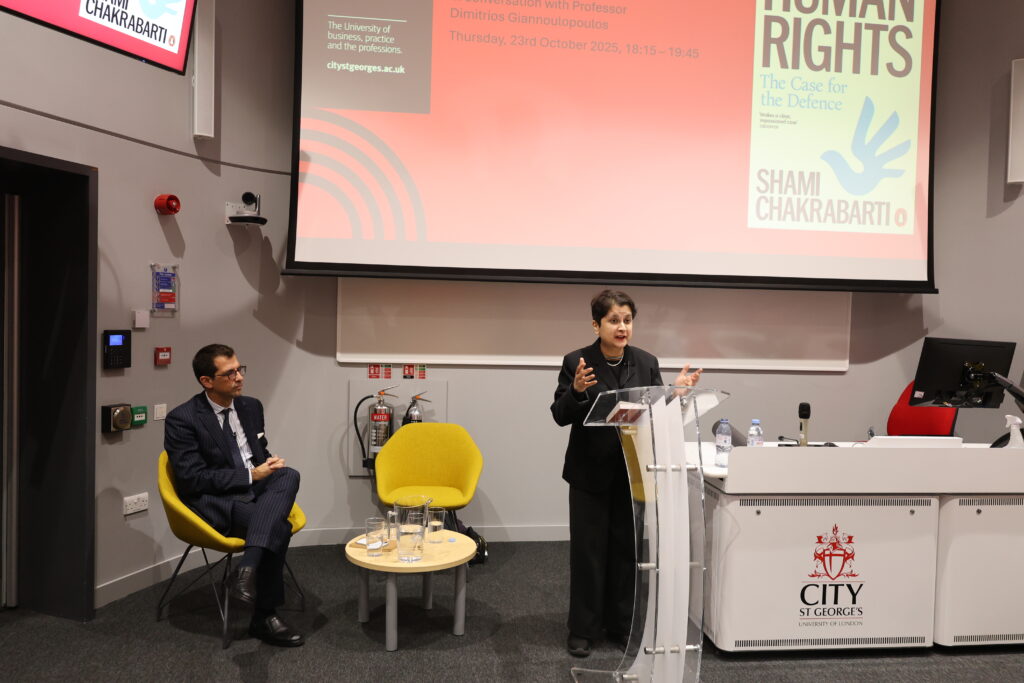
Chakrabarti chose to end her book on the climate crisis. Closing the evening, too, on this matter was a timely reminder that in harming the planet we are not just harming individuals, but humanity as a whole. By damaging our ecosystems, we damage the security of our food supply. More directly, we will continue to see climate refugees,who do not yet fit neatly into the definitions (and protections) governing refugees.
As the damage caused by climate change becomes quantifiable, we’ve seen an initial round of legal cases aiming to apportion liability for damages caused by emissions. Examples of these include Urgenda v Netherlands (2015)for liability of governments, and LLiuya v RWE, a case that lasted a decade from 2015, on the liability of individual emitters.
So what now?

Baroness Chakrabarti’s essential message was this: it is not a lawyer’s responsibility to defend Human Rights; that responsibility belongs to us all.
“Advocacy for Human Rights does not just happen in the law courts; it happens in news rooms, class rooms, and on the streets”
The Human Rights that need defending are not only those which exist today, but those which need to come into existence.
Having spent two hours in the company of such a revered voice on the subject, sharing modern concerns for the dignity of humanity, it seems that the entire audience left conscious of their rights and responsibilities, as well as what – exactly – we have to lose.
Amy is currently studying the Graduate Diploma in Law and is a member of the Lawbore Journalist Team 2025-26. She is an aspiring commercial solicitor, interested in copyright and contract law. In 2025, she graduated with BA (Hons) in Classics from Regent’s Park College, Oxford; there, she sat on the governing body of the Oxford Union, the Student Union’s Women’s Campaign, and was a founding member of Oxford Women in Government.
Thanks to Shamim Quadir (Senior Communications Officer, City St George’s) for the use of the event photographs.

